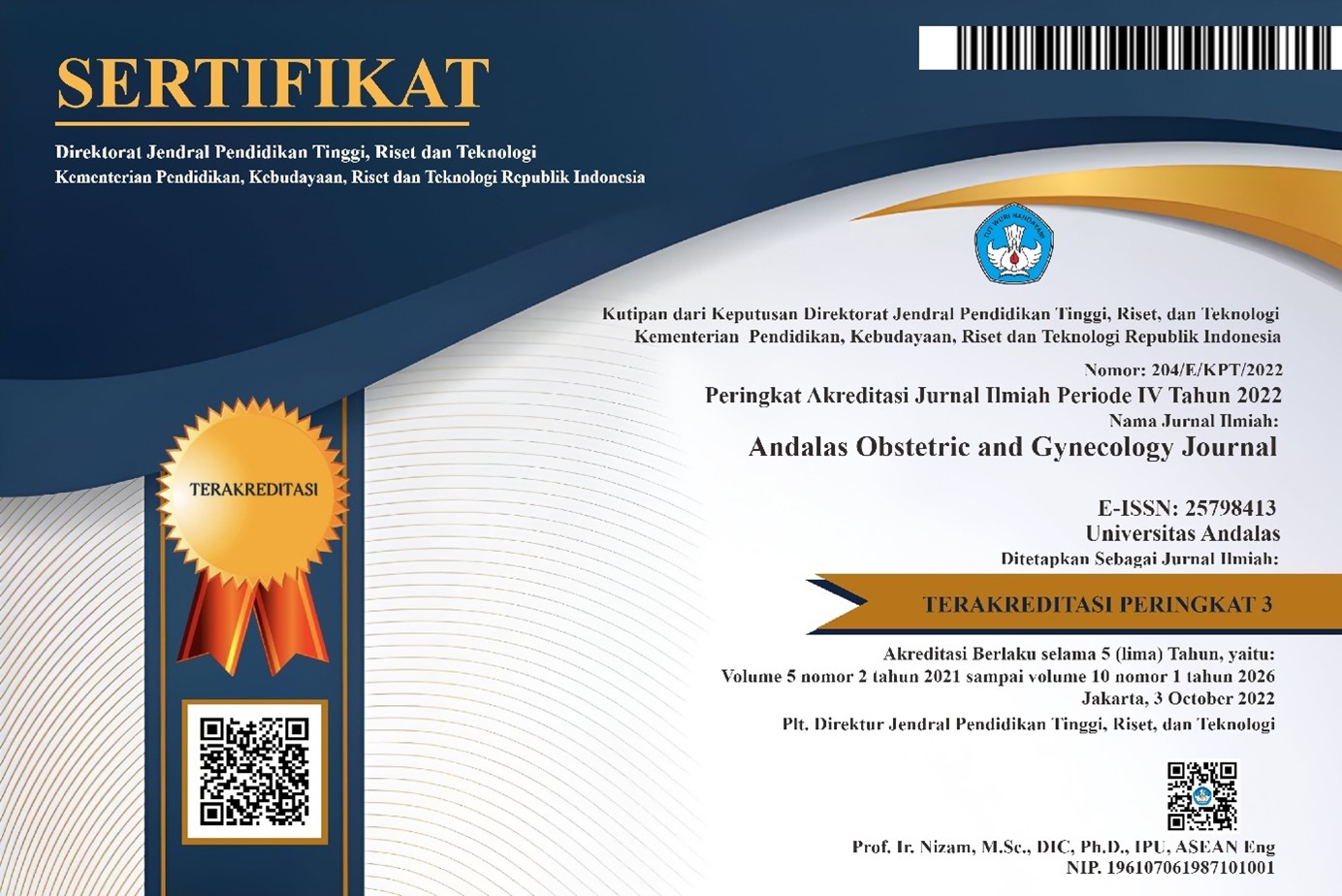Urologic Morbidity in Surgery of Placenta Accreta Spectrum in Universitas Andalas Hospital
DOI:
https://doi.org/10.25077/aoj.8.2.823-828.2024Keywords:
urologic complication, placenta accreta, urologic morbidityAbstract
Background: Hysterectomy for placenta accreta spectrum disorders is known to be associated with urologic morbidity, including intentional or unintentional cystostomy, ureteral injury, and bladder fistula.
Case: A 32year old woman with urine retention post total hysterectomy on indications placenta accreta spectrum Grade 3 type 4 S2 segment- 9 days ago, referred to Universitas Andalas Hospital. The patient complained difficulty to urinate, hematuria and supra pubic pain. Physical examination sign of acute abdomen unclear. A Pelvic abdominal ultrasound was performed, the result were Acites and complex acites, left renal hydronefrosis, cystitis and sludge gallblader. From the laboratory result found anemia, leucocytosis, trombositosis, ureum, creatinine and albumin were in normal limit, hyponatremia, hypokalemia, hypocalsemia. The patient were given antibiotics, blood transfusion and natrium, kalium and calcium correction. Cystoscopy was performed to explore the bladder, the result were found adhesion and ruptured at the posterior wall of the bladder a long 3 cm then proceed with laparotomy to repair the bladder and adhesiolisis. During hospitalization, the patient’s condition was good, hemodynamics was stable with sufficient diuresis. The patient was discharged on day 4 after laparotomy of bladder repair with temporary urine catheter installed.
Discussion: This patient diagnose previously is placenta accreta spectrum with percreta graded so had a high risk of urologic morbidity. The bladder ruptured occurred after 9th day of hysterectomy. This can occur because the injury during dissection of the uterine vesicular fold undergoes necrosis and then become opens on the 9th day after hysterectomy. A multidisciplinary team should be made in management of placenta accreta spectrum. A team comprising a consultant maternal fetal medicine with pelvic surgery experienced, a blood bank team, an anesthesiologist, a urologist skilled, an interventional radiologist and an experienced neonatologist is advised.
Keywords: urologic complication, placenta accreta, urologic morbidity
Downloads
Published
Issue
Section
License
Copyright (c) 2024 Zulfiqar Yevri

This work is licensed under a Creative Commons Attribution 4.0 International License.
Copyright
Authors who publish with this journal agree to the following terms:
- Authors retain the copyright of published articles and grant the journal right of first publication with the work simultaneously licensed under a Creative Commons Attribution 4.0 International License that allows others to share the work with an acknowledgment of the work's authorship and initial publication in this journal.
- Authors are able to enter into separate, additional contractual arrangements for the non-exclusive distribution of the journal's published version of the work (e.g., post it to an institutional repository or publish it in a book), with an acknowledgment of its initial publication in this journal.
- Authors are permitted and encouraged to post their work online (e.g., in institutional repositories or on their website) prior to and during the submission process, as it can lead to productive exchanges, as well as earlier and greater citation of published work (See The Effect of Open Access).
License:
Andalas Obstetrics and Gynecology Journal (AOJ) is published under the terms of the Creative Commons Attribution 4.0 International License. This license permits anyone to copy and redistribute this material in any form or format, compose, modify, and make derivatives of this material for any purpose, including commercial purposes, as long as they credit the author for the original work.







